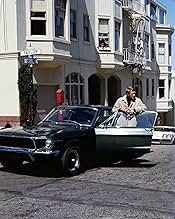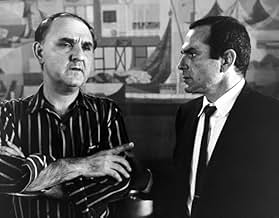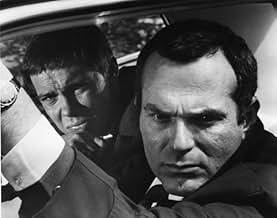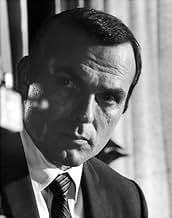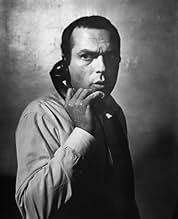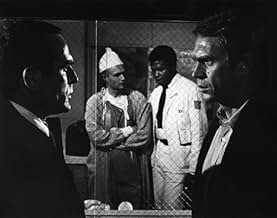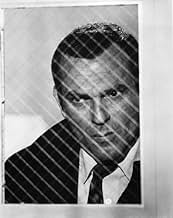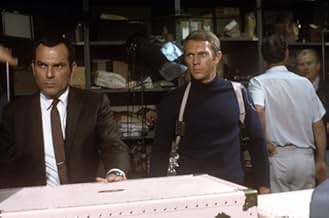Un poliziotto di San Francisco indaga per scoprire il responsabile dell'omicidio di un testimone che era stato incaricato di proteggere.Un poliziotto di San Francisco indaga per scoprire il responsabile dell'omicidio di un testimone che era stato incaricato di proteggere.Un poliziotto di San Francisco indaga per scoprire il responsabile dell'omicidio di un testimone che era stato incaricato di proteggere.
- Regia
- Sceneggiatura
- Star
- Vincitore di 1 Oscar
- 7 vittorie e 9 candidature totali
Vic Tayback
- Pete Ross
- (as Victor Tayback)
Recensioni in evidenza
What a change of pace this movie is as compared with its genre today. I'm no old fogey but would that modern directors become smart enough take several pages from its book.
The Bullit character is a precursor of Dirty Harry but a bit more cerebral. Stylistically, the director sets the stage beautifully for McQueen's Bullit. The movie has a European feel (director Peter Yates is a Brit) and achieves its dark mood through quiet understatement. The musical score for instance. Today, music is overly used, overly loud and manipulative. (i.e. in case you are not moved by this scene, here are a division of amplified violins to remind you to weep). In 'Bullit' the music is sparingly used and doesn't intrude at all. It complements the directorial style without setting the agenda.
The feeling of reserved naturalism is achieved through editing and dialogue. There really aren't very many lines in the movie and when characters do speak they are very succinct. Notice the last 15-20 minutes of the movie, most of which takes place at the airport. Hardly a line in it. There is none of the chattiness so prevalent today (especially post "Pulp Fiction") which is so tedious (unless the script is tip-top, which is rare).
Editing is, perhaps, its greatest strong point. The many long edits deserve equal credit with the dialogue in setting the low-key mood. The cinema verite dialogue of the airport scenes (and, say, the scene where McQueen and Don Gordon search the trunk) combined with the long cuts add greatly to understated feel while adding realism.
And the performances are top notch. The spare script helps McQueen shine since the taciturn moodiness fits his persona to a tee. There are very fine performances from all of the supporting cast, from Don Gordon to Bisset to Fell to Duvall to Oakland. This is a great movie for watching faces. Note the expressions of the hit men during the chase scene (just another example of this movie letting the little touches speak volumes).
The chase scene certainly deserves its billing as one of the best in movie history. Recently, 'The Transporter' was lauded for its opening chase sequence. The one in 'Bullit' is a marvel compared. In 'The Transporter' sequence I'm not sure there is a cut that lasts more than three seconds. In 'Bullit' it is again the editing which sets it apart here. The long edits give you the feel of acceleration and deceleration, of tire smoke and gears, of wind and the roller coaster San Francisco streets. You are given the time to place yourself in the frame. In short, 'Bullit' uses real craftsmanship. Films like 'The Transporter' use hundreds of quick edits to mimic the danger and immediacy of 'Bullit' but it comes across as hot air, confusion instead of clarity. The two scenes are perfect set pieces of easy (and hollow) Mtv-style flash versus real directorial substance.
The Bullit character is a precursor of Dirty Harry but a bit more cerebral. Stylistically, the director sets the stage beautifully for McQueen's Bullit. The movie has a European feel (director Peter Yates is a Brit) and achieves its dark mood through quiet understatement. The musical score for instance. Today, music is overly used, overly loud and manipulative. (i.e. in case you are not moved by this scene, here are a division of amplified violins to remind you to weep). In 'Bullit' the music is sparingly used and doesn't intrude at all. It complements the directorial style without setting the agenda.
The feeling of reserved naturalism is achieved through editing and dialogue. There really aren't very many lines in the movie and when characters do speak they are very succinct. Notice the last 15-20 minutes of the movie, most of which takes place at the airport. Hardly a line in it. There is none of the chattiness so prevalent today (especially post "Pulp Fiction") which is so tedious (unless the script is tip-top, which is rare).
Editing is, perhaps, its greatest strong point. The many long edits deserve equal credit with the dialogue in setting the low-key mood. The cinema verite dialogue of the airport scenes (and, say, the scene where McQueen and Don Gordon search the trunk) combined with the long cuts add greatly to understated feel while adding realism.
And the performances are top notch. The spare script helps McQueen shine since the taciturn moodiness fits his persona to a tee. There are very fine performances from all of the supporting cast, from Don Gordon to Bisset to Fell to Duvall to Oakland. This is a great movie for watching faces. Note the expressions of the hit men during the chase scene (just another example of this movie letting the little touches speak volumes).
The chase scene certainly deserves its billing as one of the best in movie history. Recently, 'The Transporter' was lauded for its opening chase sequence. The one in 'Bullit' is a marvel compared. In 'The Transporter' sequence I'm not sure there is a cut that lasts more than three seconds. In 'Bullit' it is again the editing which sets it apart here. The long edits give you the feel of acceleration and deceleration, of tire smoke and gears, of wind and the roller coaster San Francisco streets. You are given the time to place yourself in the frame. In short, 'Bullit' uses real craftsmanship. Films like 'The Transporter' use hundreds of quick edits to mimic the danger and immediacy of 'Bullit' but it comes across as hot air, confusion instead of clarity. The two scenes are perfect set pieces of easy (and hollow) Mtv-style flash versus real directorial substance.
Steve McQueen's career peaked in 1968 with "Bullitt" and "The Thomas Crown Affair," both ideal vehicles for his cool persona. Although superior to its recent remake, "Crown" has not aged gracefully, while "Bullitt" has held up fairly well.
Cool though he may be, Frank Bullitt is a totally committed detective, perhaps even more so than Gene Hackman's Popeye Doyle or Clint Eastwood's Dirty Harry Callahan. Bullitt is a complete professional who never takes his eye off the objective, no matter how much interference he encounters from his superiors or from Robert Vaughan's scheming politician, Walter Chalmers. And Bullitt, unlike Doyle or Callahan, operates without the histrionics. No one-liners, no yelling and screaming tantrums from this officer. You may not like him very much, but you have to respect his dedication to duty and you'll quickly share his absolute contempt for Chalmers.
"Bullitt" is best remembered for its spectacular car chase in which McQueen reportedly did most of his own driving. But this is not primarily an action film. Aside from the chase and the final shootout at SFO, there's not a lot of violence. Most of the attention is on Bullitt's maneuvering to unravel the mystery and to keep Chalmers off his back.
Recommended if you like McQueen or policiers in general. The pace may be a little slow for people under 30 who are used to a more slam-bang, less cerebral approach to this sort of thing, but "Bullitt" is still worth your time. Just don't expect "Lethal Weapon."
Cool though he may be, Frank Bullitt is a totally committed detective, perhaps even more so than Gene Hackman's Popeye Doyle or Clint Eastwood's Dirty Harry Callahan. Bullitt is a complete professional who never takes his eye off the objective, no matter how much interference he encounters from his superiors or from Robert Vaughan's scheming politician, Walter Chalmers. And Bullitt, unlike Doyle or Callahan, operates without the histrionics. No one-liners, no yelling and screaming tantrums from this officer. You may not like him very much, but you have to respect his dedication to duty and you'll quickly share his absolute contempt for Chalmers.
"Bullitt" is best remembered for its spectacular car chase in which McQueen reportedly did most of his own driving. But this is not primarily an action film. Aside from the chase and the final shootout at SFO, there's not a lot of violence. Most of the attention is on Bullitt's maneuvering to unravel the mystery and to keep Chalmers off his back.
Recommended if you like McQueen or policiers in general. The pace may be a little slow for people under 30 who are used to a more slam-bang, less cerebral approach to this sort of thing, but "Bullitt" is still worth your time. Just don't expect "Lethal Weapon."
Probably the most beautiful car chase in all of Hollywood cinema. That alone is worth the price of admission to the theater. Apart from that, I came to this movie after the chapter Quentin Tarantino dedicated to it in his recent book. Deservedly so, I would say. The forerunner of tough and pure cops, Bullitt has charisma and charm to spare, thanks in large part to Steve McQueen. The role fits him perfectly. The soundtrack is also one of the most iconic around, Lalo Schifrin knew what he was doing. Thank you Quentin for introducing me to this old film, which I include among the classics of the genre.
With the possibly exception of Casablanca, I think this must be the film I've watched on TCM more than any other. I mean, I feel like I must catch it every time it airs, not intentionally, but I turn on my TV, and there it is. It's gotten where not only do I know how every scene unfolds in order, but I also almost feel like I could write down the action shot by shot without looking. And even so, I'm still not sure I understand the plot after all these viewings! The mobsters and informants are almost meaningless. They're just there to give Steve McQueen someone to chase and shoot.
The real conflict of the movie is between McQueen's Bulitt and Robert Vaughn's Chalmers (is Superintendent Chalmers, or "Super Nintendo Chalmers" as Ralph Wiggum once called him, named after this character?). The whole movie appears to be a set-up for the one moment McQueen can say BS to Vaughn when he suggests compromise is sometimes okay. Anyway, I love the '60s vibe. I love Jacqueline Bissette wearing only pajama tops and apparently sleeping nude. I love the view of the street from her breakfast nook (looks just like the view from the apartment Benjamin rents in The Graduate). I love the flute-led jazz combo at the restaurant (they're probably somebody real and famous, at least within jazz circles, but I've never learned who).
The real conflict of the movie is between McQueen's Bulitt and Robert Vaughn's Chalmers (is Superintendent Chalmers, or "Super Nintendo Chalmers" as Ralph Wiggum once called him, named after this character?). The whole movie appears to be a set-up for the one moment McQueen can say BS to Vaughn when he suggests compromise is sometimes okay. Anyway, I love the '60s vibe. I love Jacqueline Bissette wearing only pajama tops and apparently sleeping nude. I love the view of the street from her breakfast nook (looks just like the view from the apartment Benjamin rents in The Graduate). I love the flute-led jazz combo at the restaurant (they're probably somebody real and famous, at least within jazz circles, but I've never learned who).
Steve McQueen is Frank Bullitt! Frank Bullitt is slick! 'Bullitt' is thrilling! The stylish mystery thriller that created a basis for all future police procedurals to follow! With fantastic direction from Peter Yates and immaculate attention to detail on the stunning cinematography, 'Bullitt' is an attention-demanding and action-packed adventure supported by a jazz-fuelled score. When reviewing this crime flick, who could overlook the unforgettable Mustang v Charger chase through the streets of San Francisco which is arguably the greatest and most influential car chase ever filmed. 'Bullitt' is a dark and suspenseful masterpiece from Peter Yates.
Lo sapevi?
- QuizSeveral items of clothing worn by Steve McQueen received a boost in popularity thanks to the film: desert boots, a trench coat, a blue turtleneck sweater and, most famously, a brown tweed jacket with elbow patches.
- BlooperDuring the chase sequence, the same green Volkswagen Beetle is seen at least 4 different times in 4 different locations in a period of not more than 1 minute.
- Versioni alternativeDuring the car chase, when the Charger goes wide on a corner and hits a camera, the film was salvaged and red frames added at the end, to give a "point of impact" impression. Despite this gag being in situ for decades, on the current Cinemax Asia print, someone has seen fit to completely remove these last frames of the shot.
- ConnessioniEdited into Città in fiamme (1979)
I più visti
Accedi per valutare e creare un elenco di titoli salvati per ottenere consigli personalizzati
- How long is Bullitt?Powered by Alexa
Dettagli
- Data di uscita
- Paese di origine
- Lingua
- Celebre anche come
- Đại Tá Bullitt
- Luoghi delle riprese
- Coffee Cantata, Union Street, San Francisco, California, Stati Uniti(jazz club and restaurant scene)
- Azienda produttrice
- Vedi altri crediti dell’azienda su IMDbPro
Botteghino
- Budget
- 5.500.000 USD (previsto)
- Lordo Stati Uniti e Canada
- 511.350 USD
- Fine settimana di apertura Stati Uniti e Canada
- 408.627 USD
- 7 ott 2018
- Lordo in tutto il mondo
- 512.162 USD
Contribuisci a questa pagina
Suggerisci una modifica o aggiungi i contenuti mancanti





